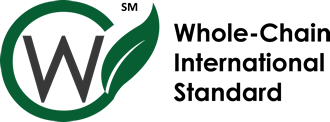
Author: Dr. Juan-Marcelo Gómez
The European Union Deforestation Regulation (EUDR) represents a powerful legislative step aimed at reducing the EU’s contribution to global deforestation. By mandating that commodities like cacao, coffee, soy, and palm oil sold within the EU must be certified as deforestation-free, the EUDR sets a robust framework for sustainable trade. However, as businesses and governments confront the challenges of supply chain traceability, transparency, and compliance, a comprehensive framework like the Whole-Chain International Standard could be instrumental in enabling companies to meet EUDR requirements effectively. Below, the EUDR is compared with the Whole-Chain Standard, positioning the latter as a critical enabler of compliance, particularly as the regulatory landscape around sustainability intensifies.
Understanding the EUDR’ Goals, Challenges, and Impact
The EUDR introduces strict requirements for verifying that imports to the EU are deforestation-free. This regulation responds to urgent global needs, addressing the EU’s role in driving deforestation through demand for commodities linked to forest degradation. The EUDR’s strict focus on transparency and accountability compels businesses to trace product origins, thereby promoting environmental protection and fair competition among EU market players. While EUDR’s environmental objectives are clear, its implementation has been met with concerns. Supply chain traceability, the economic impact on small-scale producers, and the need for verification infrastructure are among the top challenges faced by companies affected by this regulation. The European Commission’s recent proposal to delay the EUDR’s rollout by 12 months highlights the substantial obstacles businesses face in preparing for compliance.
The Role of Whole-Chain International Standard as a Compliance Enabler
The Whole-Chain International Standard, with its comprehensive procedures and emphasis on supply chain integrity, offers a structured pathway for organizations aiming to align with the EUDR. While the EUDR mandates traceability and due diligence for specific products linked to deforestation, the Whole-Chain Standard addresses broader issues of transparency, sustainability, and compliance across diverse industries.
Key Comparisons and Synergies
Scope and Focus
EUDR focuses on commodities directly linked to deforestation, specifically targeting products like soy, palm oil, and wood. Its primary concern is forest conservation and reducing climate change impacts related to deforestation.
Whole-Chain International Standard offers a holistic approach, covering a wider array of supply chain integrity issues beyond deforestation, including risk management, data security, and sustainability in all aspects of production and trade. This broad scope makes it adaptable across industries and allows it to address not only deforestation risks but also broader environmental and social impacts.
Procedural Framework
EUDR provides guidelines for due diligence, requiring companies to trace commodity origins and prove that products are deforestation-free. However, it does not offer an implementation framework or specific operational procedures to achieve compliance.
Whole-Chain International Standard outlines detailed procedures essential for supply chain transparency, such as supplier audit compliance and traceability accuracy rate, both of which align with the EUDR’s focus on traceability. Additionally, it includes risk management and continuous improvement procedures, enabling companies to maintain long-term compliance rather than addressing traceability as a one-time requirement.
Data and Technology Integration
The success of EUDR compliance hinges on the ability to trace product origins accurately. However, data collection and technological integration are left to individual companies, posing challenges for smaller enterprises or those with complex supply chains.
With KPIs that emphasize data accuracy, transparency, and privacy, the Whole-Chain Standard encourages companies to implement advanced data collection and monitoring systems. By establishing KPIs such as traceability accuracy rate and sustainable sourcing rate, the standard provides measurable benchmarks, helping companies demonstrate compliance with both EUDR and broader sustainability goals.
Support for Small-Scale Producers
Although the EUDR includes a phased implementation approach, with micro and small enterprises given until June 30, 2026, for compliance, the regulation places considerable pressure on small-scale producers to meet traceability requirements. Without structured guidance, these producers may face economic hardship in attempting to comply.
By offering a framework that includes supplier development and innovation incentives, the Whole-Chain Standard enables companies to foster sustainable practices among smaller suppliers. Supplier Sustainability Improvement Rate and other KPIs within this framework incentivize large corporations to work collaboratively with small-scale producers, promoting capacity building and reducing the economic burden of compliance.
Continuous Improvement and Long-Term Compliance
As a regulatory requirement, the EUDR establishes a baseline for deforestation-free supply chains but does not explicitly require continuous improvement beyond initial compliance.
Continuous improvement is integral to the Whole-Chain framework, with audits, risk assessments, and training programs designed to ensure that companies not only achieve compliance but maintain and enhance it over time. This ongoing approach helps companies adapt to evolving regulatory standards and consumer expectations for transparency.
Critiques and Considerations
While the Whole-Chain International Standard offers a robust framework that supports EUDR compliance, it is not without its limitations, including implementation complexity and the need for adaptation.
For organizations with limited resources, implementing the full spectrum of Whole-Chain procedures may be challenging. Smaller businesses may find it resource-intensive to establish comprehensive tracking systems and maintain the detailed documentation required.
Since the Whole-Chain Standard is broader than the EUDR’s focus on deforestation, organizations may need to adapt their procedures to align specifically with the EUDR’s unique requirements. For example, companies focusing solely on deforestation compliance may prioritize traceability metrics over other environmental KPIs.
Conclusion
The Whole-Chain International Standard provides a powerful structure for companies striving to meet EUDR compliance, addressing the regulatory requirements around traceability, transparency, and sustainability. By embedding traceability and risk management into its core procedures, Whole-Chain enables companies to demonstrate deforestation-free supply chains in line with EUDR expectations while also fostering broader sustainability practices across the supply chain. As the EUDR moves toward implementation, organizations equipped with the Whole-Chain framework will be better positioned to not only comply with this regulation but also to enhance overall supply chain integrity and sustainability. For companies seeking to go beyond compliance and establish themselves as leaders in sustainable trade, adopting the Whole-Chain International Standard is a proactive and impactful strategy.
